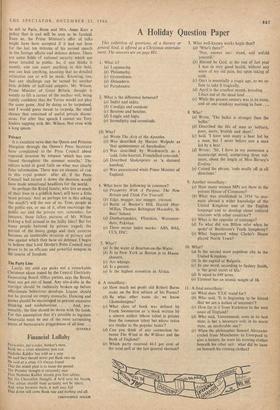A Holiday Question Paper
This collection of questions, of a literary or .general kind, is offered as a Christmas entertain- ment. The answers are on page 881.
1. What is?
(a) Logomachy.
(b) Philomathy.
(c) Graveolence.
(d) Dinanderie.
(e) Paradoxure.
2. What is the difference between?
(a) Indict and indite.
(b) Condign and condone.
(c) Benzene and benzine.
(d) Loggia and logia.
(e) Serendipity and serenitude.
(3) Who?
(a) Wrote The Acts of the Apostles.
(b) Was described by Horace Walpole as 'that quintessence of busybodies.'
(c) Was described by Wordsworth as a 'cold, false-hearted, Frenchified coxcomb.'
(d) Described Shakespeare as 'a damned humbug.'
(e) Was assassinated while Prime Minister of England.
4. What have the following in common?
(a) Prosperity With A Purpose, The New Britain and Think For Yourself.
(b) Edge, mugger, star mugger, tricouni.
(c) Battle of Bunker's Hill, Harold Mac- Millan, Thomas Babington Macauley, St. Bees' School.
(d) Dunbartonshire, Flintshire, Worcester- shire, Pakistan.
(e) These motor index marks: ABS, BAS, CCS, DSC.
5. What?
(a) Is the water at Bourton-on-the-Water.
(b) Is to New York as Boston is to Massa- ' chusetts.
(c) Are whaups.
(d) Is a punnet.
(e) Is the highest mountain in Africa.
6. A miscellany: (a) How much net profit did Robert Burns make on the first edition of his Poems?
(b) By what other name do we know Chomolungma?
(c) What class of book was defined by Frank Swinnerton as 'a book written by a sincere author whose talent is greater than the common talent but whose tastes are similar to the popular tastes'?
(d) Can you think of any connection be- tween The Wind in the Willows and the Bank of England?
(e) Which party received 44.1 per cent of the total poll at the last general election?
7. What well-known works begin thus?
(a) 'Who's there?'
'Nay, answer me: stand, and unfold yourself.'
(b) Blessed be God, at the end of last year I was in very good health, without any sense of my old pain, but upon taking of cold.
(c) Ours is essentially a tragic age, so we re- fuse to take it tragically.
(d) April is the cruellest month, breeding Lilacs out of the dead land . . .
(e) While the present century was in its teens, and on one sunshiny morning in June ...
8. Who?
(a) Wrote, 'The ballot is stronger than the bullet.'
(b) Described the life of man as 'solitary, poor, nasty, brutish and short.'
(c) Said, 'I have seen many a bear led by a man; but I never before saw a man led by a bear.'
(d) Wrote: 'Sir, I have in my possession a manuscript novel, comprising three vol- umes, about the length of Miss. Burney's Evelina.'
(e) Coined the phrase, 'rode madly off in all directions.'
9. Another miscellany: (a) How many women MPs are there in the present House of Commons?
(b) What was established in 1934 `to pro- mote abroad a wider knowledge of the United Kingdom and of the English language' and to develop closer cultural relations with other countries'?
(c) What is the opposite of contango?
(d) To what did von Billow refer when he spoke of Beethoven's Tenth Symphony?
(e) What happened when Clarke's House played North Town?
10. What?
(a) Is the second most populous city in the United Kingdom.
(b) Is the capital of Bulgaria.
(c) In one word, according to Sydney Smith, is 'the great secret of life.'
(d) Is equal to 640 acres.
(e) Element has an atomic weight of 16.
11. A final miscellany: (a) What does 'ETA' stand for?
(b) Who said, 'It is beginning to be hinted that we are a nation of amateurs'?
(c) How far is it from Yorkshire to the west coast of England?
(d) Who said, 'Government, even in its best state, is but a necessary evil; in its worst state, an intolerable one?'
(e) When the philosopher Samuel Alexander cycled from Manchester to Liverpool to give a lecture, he wore his evening clothes beneath his other suit: what did he have on beneath his evening clothes?




























 Previous page
Previous page